Eye on '07: DS
Two screens good, one screen bad!
It's a gimmick! It's a fad! It's a silly toy! It'll never stand up against the might of the vastly more powerful PSP! Who wants to play games on a touch-screen anyway? What developer is going to use the second screen for anything other than a stupid map or something?
It's been a while since you heard any of those diatribes, hasn't it? That's because in the last two years, the Nintendo DS has proved over and over again that its detractors were full of hot air. Sales of the console itself are impressive - sales of software are absolutely stunning, even more so when you consider the success of many third-party titles on the system. Top-notch third party games on a Nintendo platform? Good lord.
That said, many of the games on our list for the year are Nintendo-published titles - but as with the Wii list last week, it's important to point out that this is probably a list you'll point and laugh at in 12 months time. This year's big DS titles will undoubtedly come out of left field and surprise us all, just as they have done in the past. That's what makes the handheld console so exciting.
Eurogamer's Top Picks - DS
Children of Mana
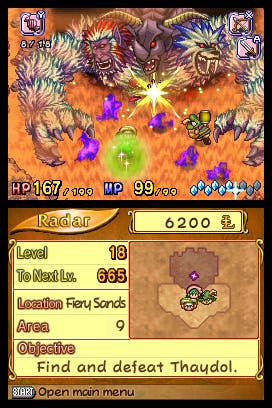
- Developer: Nex Entertainment
- Publisher: Square Enix / Nintendo
- DS Exclusive
- Gamepage
The first really big DS title of the year is out in just a few days, and undoubtedly already drawing nostalgic sighs from those who remember the SNES era. The latest in the Seiken Densetsu series of action role-playing titles retains the basic combat system of its predecessors, with real-time 2D battles, viewed from a top down perspective, being the order of the day. However, it does deviate from the design of the previous games in a number of key areas - with the gameplay being transposed into a number of dungeons, which characters travel to from the central hub of Mana Village, and the weapon system being simplified down to four core weapon types which can be wielded by any given character.
Despite this simplification, the game retains an elegant and exceptionally enjoyable battle system, not least because of a clever dual wielding system that gives each character two weapon slots, activated independently by the X and A buttons. In true Mana style, each weapon also has a different effect on the environment you're travelling through, so you'll switch weapons for puzzle-solving of sorts as much as for combat purposes. Magic, too, has been simplified in a manner which makes for a more tactical game; on each outing from Mana Village, you choose an Elemental to bring with you, and when summoned, you can either use it to attack the enemy or to bestow benefits on your party.
As you'd expect from a Mana game, the graphics are absolutely lovely - demonstrating that Square Enix has lost none of the craft which made them into the pixel art masters of the 2D home console era - and there's a four-player multiplayer mode, with both co-op and competitive modes, although sadly no support for online play over Wi-Fi Connection. Best again, for Mana fans, is the fact that Children of Mana isn't even the only Mana game on the way; Heroes of Mana, a direct follow up to Seiken Densetsu 3, is out in Japan in early March, and should hit European shores before the end of the year too.
Elite Beat Agents
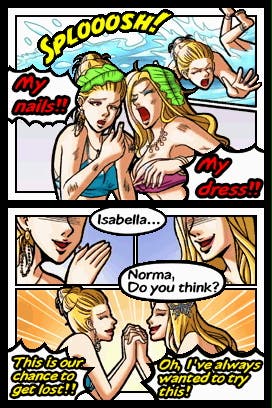
- Developer: iNiS
- Publisher: Nintendo
- DS Exclusive
- Gamepage
If you've followed Eurogamer at all in the past year or so, you'll know that for a time we became utterly obsessed with Osu! Tatakae! Ouendan, a brilliant Japanese DS title which saw you tapping out rhythm along with a number of incredibly catchy pop tunes, in the process directing a group of hilarious biker-gang style male cheerleaders to come to the aid of a variety of particularly odd people who had cried out for the help of Ouendan in their hour of need. Bizarre? Frankly, yes, but with brilliant artwork, great music, utterly compelling gameplay and bags of charm, Ouendan was absolutely our favourite Game We Don't Understand A Word Of for quite some time.
Elite Beat Agents is the long-awaited western version of the game, and while it's been stripped of much of its Japanese quirkiness (which seems a bit of a shame - Nintendo's insistence that this is because it relied too heavily on Japanese cultural references and knowledge of Japanese music rings a little false given how many people we know who loved the game and know bugger all about the Land of the Rising Sun's pop culture peccadilloes), it does retain all of the brilliant presentation and gameplay of the original title - with the cheerleaders replaced by peculiar FBI-style agents who turn up to help those in need with the power of song and dance, and the music replaced with upbeat western pop tunes.
The music in the western version features everything from Avril Lavigne to David Bowie via Madonna, Earth, Wind and Fire and The Village People, and while it's not exactly the most credible musical line-up, it's all fun, upbeat and determined not to take itself too seriously. The hardcore Japanophiles will probably turn their noses up and stick to Ouendan - but for the rest of the world, Elite Beat Agents could well be a sleeper hit.
Hotel Dusk: Room 215
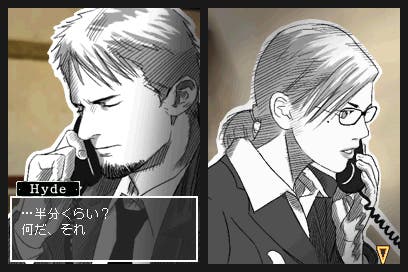
- Developer: Cing
- Publisher: Nintendo
- DS Exclusive
- Gamepage
Something many people realised early on about the DS, but which has yet to be used to full advantage, is that the platform is the best hope yet for the revival of the point and click adventure. While the likes of Phoenix Wright have gone some way down that path, they also remain heavily indebted to the rather less interactive visual novel genre which is so popular in Japan; leaving the real adventure game genre to be upheld by the likes of the wonderful Another Code: Two Memories, a flawed but enjoyable adventure title which popped up in Europe in June 2005.
Now the developers of Another Code, Cing, are approaching the finish line on their next title - another adventure game, called Hotel Dusk: Room 215 - and it looks like it could be one of the best DS games in a very long time. This time around, players hold the DS like a book (much as you did in Brain Age), and in a Film Noir style story set in 1979, you must travel to Hotel Dusk in Los Angeles and solve the mystery of Room 215, which is known as the "Wish Room"; a room whose occupants can find their deepest wishes granted.
The unique visual style of the game sees all the characters being rendered in black and white charcoal-styled drawings, while the environments themselves are navigated in 3D; the effect is striking, and all the more so because of the huge range of expressions the characters have been given. The 3D environment gives plenty of scope for puzzle solving, and we don't doubt Cing's abilities in this regard in the slightest, while the atmosphere of the game seems genuinely wonderful in a melancholy, slightly surrealist sort of way. The European release is set for the first quarter of the year; we know what we'll be curling up on the sofa with during the blustery spring months.
Pokémon Diamond / Pearl
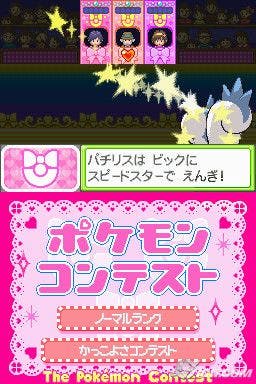
Roll your eyes all you like - the Pokémon phenomenon shows no sign of going away, and as anyone who actually plays the games can tell you, once you get past your initial revulsion at the global merchandising machine they have spawned, you'll find that the Pokémon games are incredibly well-designed, addictive, accessible, and overall, likeable. With the Gotta Catch 'Em All concept bolstered by a bright, primary colour laden world and a solid enough RPG basis, the Pokémon titles are remarkably hard to dislike, taken on their own merits - and the Diamond / Pearl double act are particularly impressive.
Being the first full outing of the series on the DS, you might expect loads of Pokémon interaction with the stylus - but you'd be disappointed on that front, with only a few marginal parts of the game actually utilising the touch-screen abilities of the console. The updates to the core gameplay are very much evolutionary rather than revolutionary, in fact - the breeding and raising system for Pokémon is tweaked, with the main difference being the introduction of male and female genders for the creatures. Of course, new Pokémon are introduced - 107 in total - and there's a brand new storyline to follow, focused on a new central character.
No, the really interesting thing about Pokémon Diamond / Pearl, aside from the fact that they're clearly going to sell a bazillion copies, is the fact that the game takes advantage of Wi-Fi Connection - so you'll be able to trade Pokémon with players from all over the world (there's even a system which allows you to make trade offers to offline players), or chat and battle with people on your friends list. Which, for shame-faced adult Pokémon fans, means you'll finally have opponents to try out your creatures on without having to sit in a car outside a school playground hoping your Wi-Fi reaches far enough (and that you don't get arrested). Which is nice.
The Legend of Zelda: Phantom Hourglass
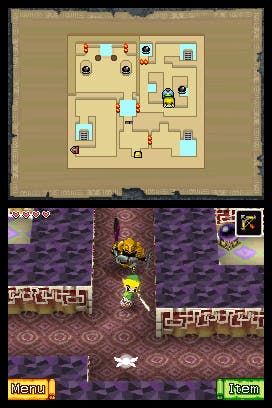
- Developer: Nintendo EAD
- Publisher: Nintendo
- DS Exclusive
- Gamepage
It's remarkably difficult to continue to be excited about a game on an ongoing basis for well over a year, but we achieve this pretty much consistently for the majority of Zelda titles - and Phantom Hourglass is no exception. Billed as a direct sequel to Wind Waker - and adopting the same cel-shaded graphics as the GameCube outing - the game is the first 3D Zelda to appear on a handheld platform, and is also one of the first full-size Zelda adventures to include a multiplayer mode.
Best of all, Phantom Hourglass makes the touch-screen functions of the DS into an absolutely critical part of the gameplay, rather than just treating it as an interesting extra tool for puzzle solving. Players navigate Link around with it to some extent, and as well as drawing shapes to access various abilities. Like Wind Waker, there's plenty of sailing around in the game, but this time you can plot your course using the touch-screen in advance and then spend the sailing time fighting enemies with the boat's cannon.
The game also takes on a unique form thanks to the use of a "Master Dungeon", a single dungeon to which you return time and again as you play. Your progress through this dungeon is regularly halted, and you need to go and complete other smaller dungeons in order to get further through - an interesting structure, and one which is added to by the introduction of "Chasers", indestructible enemies who pursue you through the Master Dungeon and can kill you with one hit, which gives a sense of urgency to the proceedings.
Due out towards the end of this year, Phantom Hourglass is top of the most-wanted list for most traditional gamers who own a DS - and with good reason. After all, when was the last time a Zelda adventure actually disappointed? What will be interesting to see is whether the many non-gamers who have picked up a DS in the last year will also warm to Nintendo's much-loved franchise.








